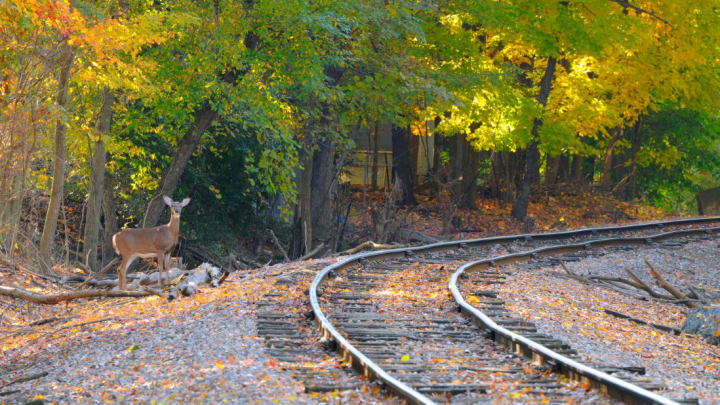In Japan, growing deer populations are causing friction on the railways. The number of deer hit by trains each year is increasing, so the Railway Technical Research Institute has come up with a novel idea for curbing the problem, according to the BBC. Researchers there are using the sound of barking dogs to scare deer away from danger zones when trains are approaching, preventing train damage, delays, and of course, deer carnage.
It’s not your standard horn. In pilot tests, Japanese researchers have attached speakers that blare out a combination of sounds designed specifically to ward off deer. First, the recording captures the animals’ attention by playing a snorting sound that deer use as an “alarm call” to warn others of danger. Then, the sound of howling dogs drives the deer away from the tracks so the train can pass.
Before this initiative, the problem of deer congregating on train tracks seemed intractable. Despite the best efforts of railways, the animals aren’t deterred by ropes, barriers, flashing lights, or even lion feces meant to repel them. Kintetsu Railway has had some success with ultrasonic waves along its Osaka line, but many rail companies are still struggling to deal with the issue. Deer flock to railroad tracks for the iron filings that pile up on the rails, using the iron as a dietary supplement. (They have also been known to lick chain link fences.)
The new deer-deterring soundtrack is particularly useful because it's relatively low-tech and would be cheap to implement. Unlike the ultrasonic plan, it doesn’t have to be set up in a particular place or require a lot of new equipment. Played through a speaker on the train, it goes wherever the train goes, and can be deployed whenever necessary. One speaker on each train could do the job for a whole railway line.
The researchers found that the recordings they designed could reduce the number of deer sightings near the train tracks by as much as 45 percent during winter nights, which typically see the highest collision rates. According to the BBC, the noises will only be used in unpopulated areas, reducing the possibility that people living near the train tracks will have to endure the sounds of dogs howling every night for the rest of their lives.
Deer aren't the only animals that Japanese railways have sought to protect against the dangers of railroad tracks. In 2015, the Suma Aqualife Park and the West Japan Railway Company teamed up to create tunnels that could serve as safer rail crossings for the turtles that kept getting hit by trains.
[h/t BBC]
